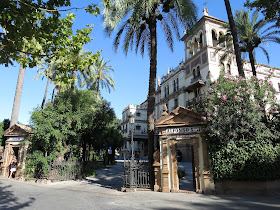Day 5 - Saturday 16th August 2015
The next day dawned as scorching as ever, and we started off on our quest for Red-knobbed Coots – our main target for the day. Laguna de Medina, once a stronghold for this species, unfortunately turned up nothing despite the abundance of Common Coots, with several hundred birds present on the large lake. A close Little Bittern was great to see, offering much less obscured views than our first bird at Bonanza Pools, whilst a Purple Swamphen in the reeds to the left of the hide was another bonus. Several newly fledged Penduline Tits danced their way across the bulrushes in front of the hide, but with the heat now reaching even greater heights, we moved on to our next site of Lagunas de Espera hoping for some better luck.
 |
| Little Bittern - Photo by Alex Jones |
 |
| Penduline Tit - Photo by Alex Jones |
Ever the observant, Chris then
announced he had an odd looking raptor in the scope, and aligning Alex’s to get the bird in view I was met by a large
Buzzard species. With Chris having experience of African and European birding
he was strongly reminded of Long-legged Buzzard, although checking my Collins
guide I wasn’t convinced – something just wasn’t right plumage wise. As the
bird circled closer and with scopes still trained, we watched as incredibly it
came lower before landing in a bush on the opposite hill. Alex had managed to
reel of some distant record shots, and we piled back in to the car and drove up
to where the bird had landed in the middle of one of the barren fields. The
heat haze made viewing exceptionally difficult, and with me staying in the car
and taking more photos, Alex and Chris approached closer to get more details on
the plumage through the scopes.
With Alex and Chris approaching the small shrub, I watched as the bird arose and managed a number of snaps, which along with Alex’s from earlier gave us a great range of plumage details from the bird in a variety of positions.
Carefully analysing what we had obtained, we were still very much in the dark. Chris was still certain we had a Long-legged Buzzard, while the white markings on the back had me thinking there may have been some Bonelli’s Eagle influence. The face however was distinctly buzzard like, as were the underwings, and we were still none the wiser as to the identity of our mystery bird.
With Alex and Chris approaching the small shrub, I watched as the bird arose and managed a number of snaps, which along with Alex’s from earlier gave us a great range of plumage details from the bird in a variety of positions.
Carefully analysing what we had obtained, we were still very much in the dark. Chris was still certain we had a Long-legged Buzzard, while the white markings on the back had me thinking there may have been some Bonelli’s Eagle influence. The face however was distinctly buzzard like, as were the underwings, and we were still none the wiser as to the identity of our mystery bird.
Getting back to the UK I did
some research to try and solve the mystery, and came across an interesting
paper detailing the emergence of Gibraltar Buzzards – a hybrid between Common
Buzzards and Atlas Long-legged Buzzards (the paper in question). First originating near Gibraltar where
naturally the two species have the highest chance of meeting, these hybrids
have now spread over Southern Spain, even as far north as Seville. With
Long-legged Buzzards only very rarely recorded in Spain, it was highly unlikely
that we would encounter two on our journey (we spotted a second individual near
Osuna a day later). This coupled with the highly irregular plumage details we
encountered meant that the birds were most probably “Gibraltar Buzzards” –
unfortunately hybrids and not a true species in their own right.
With the afternoon pressing
on, we continued down the track to a small parking area, before heading out on
foot to the second and third pools at Laguna de Espera, hoping Red-knobbed
Coots could be found on at least one! The heat was now completely unbearable,
and having drank all my juice supplies I was without a source of hydration –
not a good mix! Having made it to the first hide and despite it being well
covered, for some reason the birds all inexplicably flushed! An otter seen
later running across the track may have been the culprit, but we now had an
even trickier task as the birds were much further away.
Alex had a pair of Ferruginous
Ducks in flight, whilst Red-crested Pochard, Mallards, Shovelers and Gadwall were all
present. With the huge distance between us and the birds it was going to prove
exceptionally hard to pick out any Red-knobbed Coots, so we headed on to the
third lagoon. This proved to be some distance away, and when we reached a fork
in the path the heat just proved too much. Telling Alex and Chris to go on
ahead and that I’d stay under the shade of a tree, they weren’t having any of
it, and we thankfully headed back to the car as a team, stopping at regular
intervals in the shade to stop any dehydration setting in. Thanks to both of
them for looking after me and making sure I was ok!
 |
| Sage Skipper - Photo by Alex Jones |
With the heat still scorching
hot and not abating in the slightest, we headed to our penultimate night’s stay
in the beautiful city of Seville, (where our hotel had keys replaced with James
Bond style fingerprint scanners!) and we enjoyed a delicious dinner of tapas
after taking in the sights.









No comments:
Post a Comment